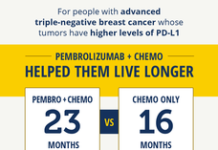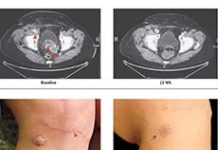As we reflect on the publication of our Early Detection and Diagnosis of Cancer Roadmap last year – we speak to Professor Eithne Costello about the challenges of ambitious trials, the evolution of early detection as a field in its own right and why a guiding framework is all important…

Could you tell us a little about your work?
Detecting pancreatic cancer earlier is a priority for our research group. With no population-wide screening available, we are trying to understand how to screen the highest risk group for this disease, namely individuals over 50 newly diagnosed with diabetes.
This is the focus of our Cancer Research UK (CRUK)-funded study – the UK-Early Detection Initiative (UK-EDI).
I have worked on pancreatic cancer for the past 21 years. Of the major cancer killers, pancreatic cancer is the deadliest, due in part to difficulties in diagnosing the disease. More than half of all cases of pancreatic cancer are first diagnosed at stage IV. The average survival rate for stage IV pancreatic cancer is between two and six months. Around one in five patients is eligible for potentially curative surgery, and for these patients the outlook is much better, with over 30% surviving five years.
Pancreatic is unique among cancers in that at the time of diagnosis, well over half of all pancreatic patients have elevated blood sugars with around 30% having recently become diabetic. Diabetes onset precedes cancer diagnosis by six months to one year, generating a time window during which a timely intervention could be made.
Your programme award is ambitious – from biomarker validation right through to economic benefits of early diagnosis of pancreatic cancer. How important is a coordinated approach to this?
Yes, the programme is ambitious. We are recruiting people over 50 who have been diagnosed with diabetes within the last six months. We will collect blood samples and clinical data from participants at appointments every six months for two years. Comparisons between those that go on to develop pancreatic cancer and those that don’t will help researchers pinpoint biomarkers for this deadly disease.
A study such as ours requires a broad range of expertise and we knew that putting together a great team was important. The UK-EDI study involves patient groups, biomedical scientists, general practitioners, oncologists, surgeons, endocrinologists, epidemiologists, statisticians, clinical trialists, and health economists.
We wish to determine how early detection of pancreatic cancer could be achieved and gain an understanding of the cost effectiveness of it. For us, multidisciplinary collaboration is essential.
Such a large programme of research always comes with challenges, what have been the biggest so far?
By far the greatest challenge has been the COVID-19 pandemic. Opening our study to recruitment was significantly delayed, and we incurred repeated loss of sponsorship. We understand fully the importance of not burdening the NHS during this difficult time, but it has been frustrating. We hope, as we get back to ‘normality’, that the public feel confident enough to engage in research studies that involve attending health care facilities. I am glad to say that UK-EDI is now open to recruitment.
In terms of cancer early detection in general – how will the field benefit from a framework, like our Early Detection and Diagnosis of Cancer Roadmap?
Although some of us have been doing early detection work for many years, in many ways the field itself is quite young and evolving. Encouragingly, the field is now also attracting new people. This is exciting and there’s a lot of experience and good practice to be shared. Therefore, taking a holistic view, which involves all stakeholders, is crucial. It sets a marker of where we are but also where we want to be. With early detection and diagnosis emerging as the priority for government, funders, researchers and industry to improve outcomes for cancer patients, the Roadmap is extraordinarily useful.
Currently, there is no blood-based test to reliably identify early pancreatic cancer – how realistic is a national biomarker-driven screening programme? And what are the challenges to making this a reality?
I’ll start with the challenges associated with screening of the asymptomatic population for pancreatic cancer. Despite the fact it is a very common cause of cancer-related deaths, idiopathic pancreatic cancer has an incidence of only 8-12 per 100,000. Although incidence is higher in those over 50 (around 35 per 100,000). With such a low disease incidence, even highly specific tests (i.e. greater than 99% specific) would incur a large number of false-positive screening results.
False-positive tests for pancreatic cancer are serious – they cause distress, result in unnecessary and potentially harmful diagnostic evaluation (in some cases, a diagnosis requires surgery), and would carry a significant needless cost to the NHS. Until such time as highly accurate tests are available, it is important to identify those individuals who are at sufficient risk of developing pancreatic cancer to experience a net benefit from screening.
Screening of high-risk groups – which include individuals in families with an inherited risk, and people with cystic lesions – increases the rate of detection and reduces false-positive results. As mentioned earlier, the largest high-risk group comprises individuals aged over 50 who have recently been diagnosed with diabetes. The first challenge is to effectively detect the disease early in these high-risk groups. Once we can do that, the lessons gained will allow expansion into larger populations.
I am optimistic that, with time and continued investment, there will a national biomarker-driven screening programme for this cancer.
Eithne is Professor of Molecular Oncology at the Institute of Systems, Molecular and Integrative Biology based at The University of Liverpool.
She leads the CRUK-funded UK-Early Detection Initiative for pancreatic cancer, established to detect pancreatic cancer earlier in individuals with new-onset diabetes mellitus. She also chairs the European Study Group for Pancreatic Cancer (ESPAC) translational steering committee.








